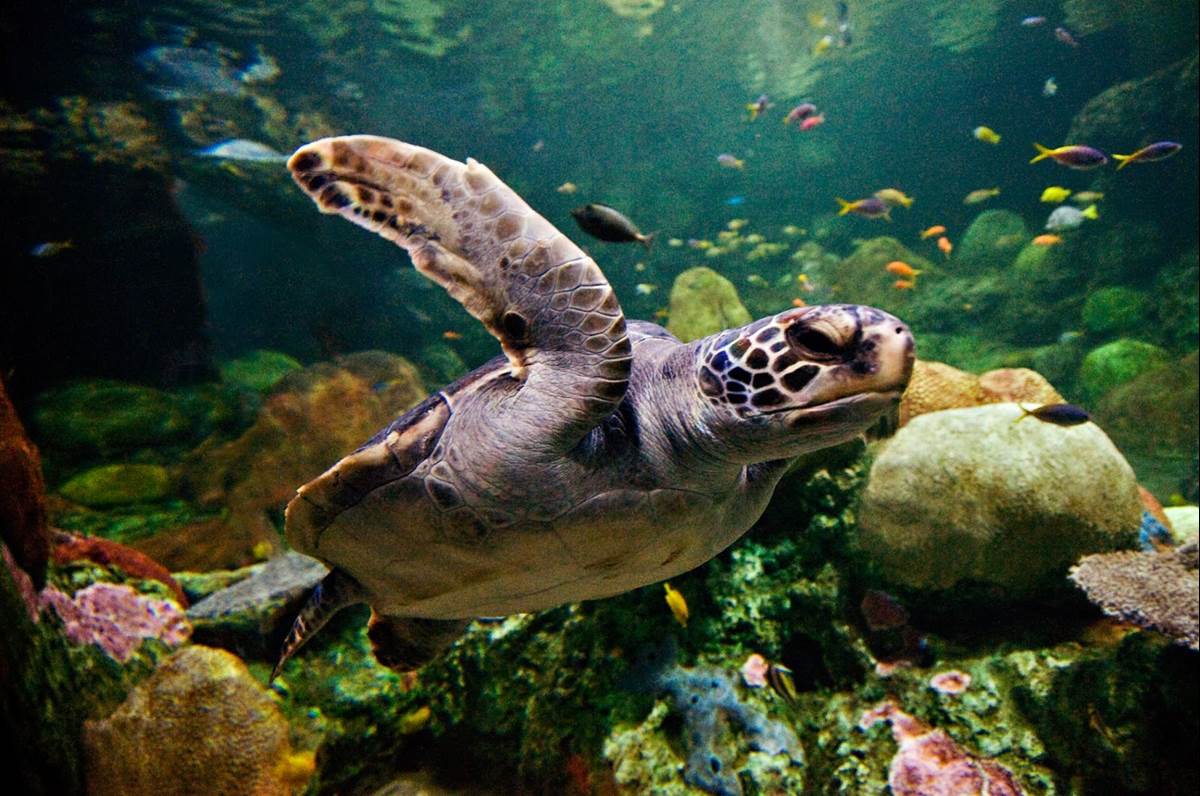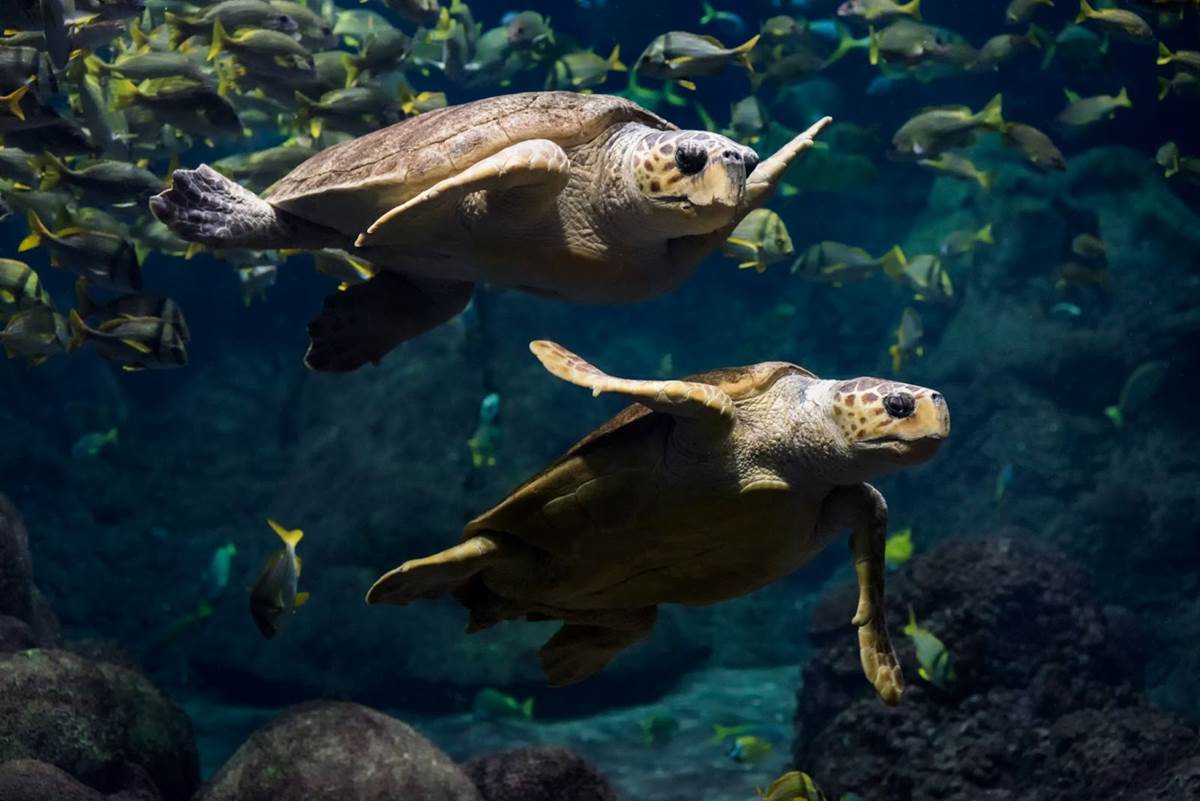Sea World San Diego Reopens Newly Enhanced and Upgraded Sea Turtle Habitat
SeaWorld San Diego has introduced a newly enhanced and upgraded Turtle Reef, an environmental habitat to sea turtles including Bruce, a rescued and non-releasable green sea turtle, that all receive SeaWorld’s world-class animal care and expertise.
- The habitat had been closed since October 2021 for enhancements and upgrades and recently reopened to the public.
- The sea turtles are among more than 250 different species of animals at SeaWorld San Diego, an accredited zoological facility, that guests can see while at the park.
- Eight new skylights were added to allow natural sunlight to filter in over the animals in addition to a new large and now seamless main viewing window.
- Additional species of tropical fish are currently being added to the habitat.
- Flooring throughout the guest viewing areas has been enhanced and repainted, along with the addition of new themed rocks, and additional air conditioning ducts, to improve the guest experience as they move through the area.
- Guests can now get an up-close look at resident turtles in San Diego that include threatened green and loggerhead sea turtles, and endangered hawksbill sea turtles.
- As part of Turtle Reef’s opening and SeaWorld’s commitment to education and conservation efforts, SeaWorld will host daily Turtle Talks starting on April 23 with an animal educator who will share sea turtle stats and facts, rescue and unique stories of species in the habitat, plus answer questions to inquiring guests about the species and their environment.
- Turtle Talk times are subject to change and guests are encouraged to visit the daily park schedule on the website.
Interactive Educational Experiences:
- SeaWorld’s turtle habitats offer interactive experiences for guests or all ages where they can learn about sea turtle nesting, where turtles live, what they eat, and the threats that lead to six of the seven species of sea turtles found in the world being classified as threatened or endangered.
- Educational games also teach players the importance of sea turtle conservation with elements and challenges designed to highlight various threats to turtle species, including predatory ocean animals and human-caused pollution.
- For example:
- TurtleLink is a touch-screen map of the globe that enables guests to track real live sea turtles in oceans all over the world. When guests touch a turtle on the digital map, the map displays information, photos and even video footage of turtles being returned into the ocean.
- Interactive family friendly video game Race to the Beach enables guests to select a hand-held controller in the shape of a sea turtle and guide the journey of their animal to the Baja Peninsula to lay eggs, while navigating manmade and natural challenges that the turtles face in the wild. Each controller is tied to a specific species of turtle and recreates their trek including the unique things each turtle species eats. The game helps players better understand the migration and challenges that sea turtles face in the wild. This is the first interactive educational activity in SeaWorld parks using gamification.
Individualized Care and Specialized Treatment and Nutrition
- Providing world class animal care is a top priority for SeaWorld. Animal care specialists and veterinarians observe and assess behavior and check the physical health of each animal.
- This includes inspecting flipper and shell conditions and scrubbing shells to remove algae.
- In-depth health assessments are performed with physical examinations that track changes in weight and size and through bloodwork to check for overall system health.
- Animal care specialists utilize color-coded targets to engage the animals mentally, help separate turtles from each other during feeds to monitor and ensure they are receiving the proper diet, and help in the movement of turtles for physical exams.
- In addition to thorough health exams, SeaWorld provides specialized care for sea turtles with unique health conditions.
Purchase with a Purpose to Support Conservation Efforts
- After viewing the sea turtles in their habitat and learning more about the species, guests can visit the newly remodeled Turtle Reef gift store to shop for new merchandise and arrivals.
- Only available at the park for purchase, guests can choose from a new line of SeaWorld Rescue items including collector SeaWorld Rescue doll sets and play sets, apparel, turtle plush and more.
- Starting this week, guests will receive 10% off select turtle merchandise for a limited time.
- Plus, a portion of every SeaWorld Rescue purchase goes directly to the SeaWorld and Busch Gardens Conservation Fund to help wildlife and wild places all over the world.
Park Offerings Provide Something Fun for Everyone
- In addition to visiting Turtle Reef, guests can enjoy animal presentations, family and thrill rides, interactive exhibits, fireworks and more this month.
- SeaWorld San Diego has two more weeks of Seven Seas Food Festival, the park’s biggest food and drink festival with more than 150 mouthwatering food and drink offerings and 30 new flavors with unique recipes from around the world running Fridays, Saturdays and Sundays through May 1.
- As part of the event, guests can enjoy SeaWorld’s firework spectacular every Friday and Saturday throughout April.
- For hot days and spring evenings, guests can enjoy the wind and water in their face by riding Emperor, California’s newest, tallest, fastest, and longest dive coaster that is now open, or recently reopened Journey to Atlantis, a fan-favorite that is part thrill ride, part water ride for those warm sunny San Diego days.
What they’re saying:
- Eric Otjen, Curator of Zoological Operations and Animal Rescue at SeaWorld San Diego: “Sea turtles play an important role in maintaining healthy ocean ecosystems including, among other things, maintaining healthy seagrass beds and coral reefs, but sadly every species is currently threatened or endangered. Through combining education with world class animal care and permanent homes for sea turtles that cannot be returned to the wild ocean, SeaWorld is furthering its conservation mission to protect marine animals and their habitats.”


